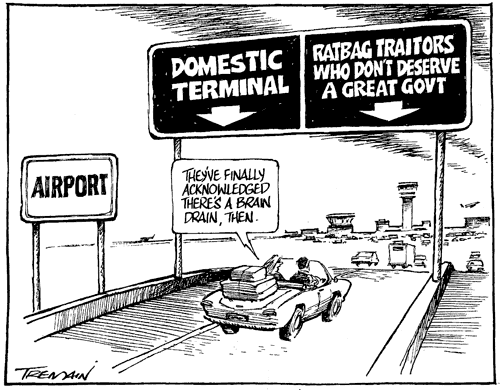Can you blame them for leaving?
I was sitting outside having a smoke and enjoying a cup of coffee while writing a University Assignment for my Chinaman friend (which he paid me to do), somehow I drifted off about thinking about the level of competition in Malaysia. Then I recalled about this one article which I read in The Star about how Malaysia is stuck in the middle-income trap, and if the government changed certain policies, future developments would soon ensue. One of the policies which the article suggested changing was government subsidies.
But wait, aren't subsidies meant to help people? Millions of Malaysians can buy rice, sugar, and more importantly petrol, at much lower rates compared to our neighboring countries? Wouldn't it be better to help our poor economy if the government kept subsidizing shit and feed it straight into our pie-holes? I came up with a perfect illustration on the effects of the government subsidies. Let's make things simpler, and look at it from a different angle;
Assume you have a kid, old enough to talk. Now as he grows, you'll need to continue feeding him, and pay his share of housing costs, utilities, school or university fees, parking tickets, and in some cases, you inadvertently give your kids money to go clubbing or buy drugs. When the time comes, he'll graduate, gets his own job, and you stop paying his fair share of costs; although this depends exactly on when he moves out. So as a parent, you want your kids to grow up, get a job, and stop depending on you right?
Don't you think Malaysian's are at a stage where they're old enough to get a job, so that our parents (our lovely government) don't have to subsidize (pay) for our living costs anymore? If you keep giving money to your kids, wont they end up being too dependent on you?
And more importantly, why are they subsidizing retarded things? The logic of subsidizing things, to me, is to help things grow, develop, and mature (e.g. Transportation, Renewable Energy, Education). So let's take a look of the things in which the government subsidizes;
1. Rice - For what purpose? I'm pretty sure without subsidy it would still be affordable. Did the government want us to eat a lot of rice and end up being fat, then die from obesity, depriving the government the ability to tax us?
2. Sugar - It's sweet for the government to do so, but I think Malaysian's should also taste the bitter side of life. Does more sugar intake result in an increase in economic development? Does more intake result in better employment, higher education, or technological development? No. It results in deaths, and one less person to pay taxes to the government.
3. Petrol - The heart of the global economy. I can understand the subsidy from a commercial perspective, so why not subsidize trucks or commercial vehicles only? Why not fix it at a certain percentage to the market price? Cheaper petrol results in more cars (obviously profiting Perodua and Proton, especially Petronas) but it also creates an environment where citizens dont pressure the government enough to develop a more efficient Public Transportation system (e.g. South Korea and Japan). I'm still waiting for the KVMR which the government promised to build 100 years ago.
4. Controlled Prices - Controlling the price of Chicken constricts developer's profits - also a form of subsidy, turning us into cowards or more accurately, we become chicken shit. Beef? Why bother controlling the price of beef? I didn't know that if you control the price of beef, it would have vast effects in developing our intellectual capacity?
I smell corruption.
The effects are simple. When you end up subsidizing bullshit things, the government can't spend effectively to develop a country, resulting us being stuck in the middle income trap, and a butt load of Malaysians moving overseas to countries where they don't subsidize things which a 12 year old would need.
I know most of the things I just said are nothing more than mere rants, but I do know that some of it is true and factual; so now we know about it, what do we do with it?
I know most of the things I just said are nothing more than mere rants, but I do know that some of it is true and factual; so now we know about it, what do we do with it?

No comments:
Post a Comment